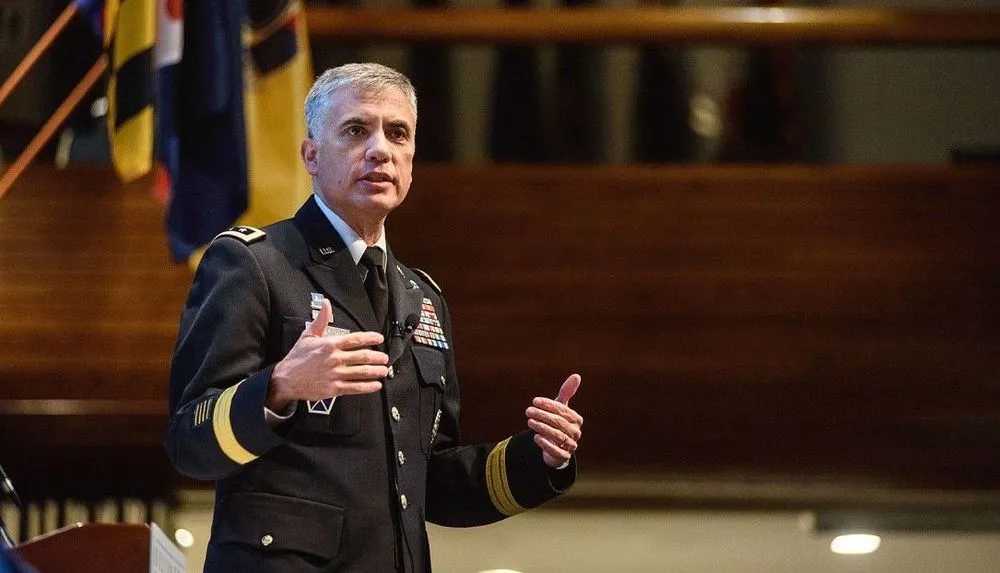Cyber Command chief: U.S. has 'stepped up' to protect Ukraine's networks
U.S. Cyber Command chief Gen. Paul Nakasone said Tuesday that his organization has “stepped up” its efforts to strengthen Ukraine’s networks and cyber defenses against Russian digital attacks since Moscow began its invasion in February.
“We provided remote analytic support to Ukraine and conducted network defense activities aligned to critical networks from outside Ukraine — directly in support of mission partners,” Naksone, who also leads the NSA, said in written testimony to the Senate Armed Services Committee.
The command also increased the number of “hunt forward teams” sent to Eastern Europe to uncover potential network vulnerabilities — a step Nakasone mentioned in testimony last month before the Senate Intelligence Committee — including in the run-up to the assault when Cyber Command deployed a group “who sat side-by-side with our partners to gain critical insights that have increased homeland defense for both the United States and Ukraine,” according to Nakasone.
“These operations have bolstered the resilience of Ukraine and our NATO Allies and partners.”
The command also provided intelligence before Moscow launched its assault, warned U.S. critical infrastructure entities to “tighten” their network defenses and “accelerated efforts against criminal cyber enterprises,” he said.
Nakasone warned the “current crisis is not over” as Russian military and intelligence services are utilizing a “range of cyber capabilities,” including to support Moscow’s invasion and defend its actions via a global propaganda campaign.
The testimony comes as U.S. and world leaders grow anxious that Russia might unleash its sprawling hacker army against Ukraine as the conflict has entered its second month seemingly at a stalemate. On Monday, National Security Adviser Jake Sullivan said Moscow is "revising its war aims" as it repositions its forces to focus on the eastern part of Ukraine.
While the U.S. and the United Kingdom blamed Russia’s military intelligence service for attacks that temporarily disabled some Ukrainian government websites, the war has thus far lacked sweeping cyberattacks against Kyiv’s electric grid and other infrastructure.
President Joe Biden’s fiscal 2023 budget request seeks to give Cyber Command a major dollar infusion as it contends with adversaries like Russia, China, Iran and North Korea and juggles a portfolio of missions that has grown to include election security and ransomware.
The administration’s proposal asks Congress to approve an overall budget of $717 million for Cyber Command, compared to $667 million the previous fiscal year, a Pentagon spokesperson told The Record.
In his testimony, Nakasone called China a “challenge unlike any other we have faced” and has created a “China Outcomes Group” — a joint Cyber Command and NSA task force — to ensure “proper focus, resourcing, planning, and operations” to counter Beijing’s rising global influence.
The four-star also said his command has “taken numerous actions over the past year to combat ransomware” following last year’s high-profile attack on the Colonial Pipeline, with his forces and NSA “passing key insights in near-real time” to law enforcement, industry and others.
Cyber Command has also begun preparing to defend the 2022 midterms from foreign interference, as it has done so in the previous two national elections. Nakasone said he has once again tapped a Cyber Command general officer and an NSA senior executive to oversee election security ahead of November.
“We anticipate that our adversaries will continue using their military and intelligence elements to affect our democracy,” he warned, dubbing election security an “enduring, no-fail mission” for Cyber Command.
Martin Matishak
is the senior cybersecurity reporter for The Record. Prior to joining Recorded Future News in 2021, he spent more than five years at Politico, where he covered digital and national security developments across Capitol Hill, the Pentagon and the U.S. intelligence community. He previously was a reporter at The Hill, National Journal Group and Inside Washington Publishers.



